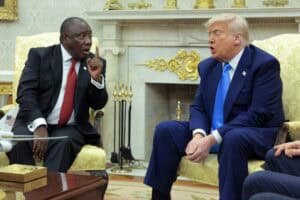The report said FinSurv determined that Ntaba Nyoni Estates did not contravene Exchange Control Regulation 6(1) although the US dollars remained undeclared at the farm for longer than 30 days.

The South African Reserve Bank has made public its report into the theft of a large sum of foreign currency from President Cyril Ramaphosa’s game farm, Phala Phala.
The theft, which happened on 29 February 2020, only became public knowledge when Arthur Fraser, former head of the state security agency, laid a criminal complaint against Ramaphosa, alleging that the president contravened fiscal and exchange control regulations.
The report noted some “inconsistencies and non-alignment” in the evidence provided by the people asked to provide information but found no material inconsistencies in Ramaphosa’s affidavits.
The compliance and enforcement division of the financial surveillance department (FinSurv) at the South African Reserve Bank (Sarb) investigated whether Ramaphosa’s farm, registered as Ntaba Nyoni Estates CC, received foreign currency in the form of US dollars and kept it on the farm without declaring it to the relevant authorities before it was stolen.
While the complaints as well as the criminal complaint were against Ramaphosa, the report only refers to investigating Ntaba Nyoni Estates Close Corporation trading as Phala Phala Wildlife. Ramaphosa is the only member of the CC.
ALSO READ: Reserve Bank governor stresses Phala Phala money was stolen before sale was finalised
The scope and purpose of the investigation was only to determine if there were exchange control violations after the Sarb received written complaints from the DA, ActionSA, EFF, non-profit organisation Isighungu Sabasha, and the standing committee on finance in parliament.
According to Exchange Control Regulation 6(1), “Every person resident in the Republic who becomes entitled to sell or to procure the sale of any foreign currency, shall within 30 days after becoming so entitled, make or cause to be made, a declaration in writing of such foreign currency to the Treasury or to an authorised dealer.”
The Sarb investigation found the stolen dollars were part of a cash payment of $580 000 (R10.6m) for 20 buffalos from Ntaba Nyoni Estates CC.
Selling the Phala Phala buffalos
Ramaphosa and Hendrik von Wielligh, the general manager of Phala Phala, decided in 2019 to sell a herd of “lower quality” buffalos as a “parcel” for hunting or auction. On 25 December 2019, Hazim Mustafa, a Sudanese businessman, arrived at the farm and Sylvester Ndlovu, the acting lodge manager, took him to see the buffalos.
According to Hazim, he identified 20 animals he wanted to buy and Ndlovu told him that the price per buffalo was R400 000. Hazim considered this amount reasonable and gave Ndlovu $580 000 (about R8 million at the day’s exchange rate) as a security deposit that would be used to pay for the buffalos only once he secured end-buyers.
ALSO READ: Third suspect arrest expected in Phala Phala Farm theft case
However, the report states Ramaphosa and Ndlovu did not mention in their affidavits that the sale would only go through when he secured end-buyers. Ramaphosa and Ndlovu said the sale could not be finalised until the necessary approvals were obtained and further processes followed. Ndlovu then gave Hazim a ‘note’ to record that he received the cash.
The report states Hazim decision to find end-buyers “seems consistent” with his inaction of almost two and a half years after the sale. Ramaphosa also indicated he was not aware of any communication with Hazim after the sale, but acknowledged that he owes Hazim the buffalos or his money. He stated that arrangements to deliver the buffalos or refund Hazim will be made once “this whole thing settles”, according to the report.
Ramaphosa was not at the farm at the time but was informed of the transaction when he arrived on the property the following day. His instruction was to keep the cash on the farm until his next visit when he would brief Von Wielligh on how to process the transaction and bank the money.
Moving the cash to safe place
Around 30 December 2019 Ndlovu decided to move the cash from the safe to a bedroom because many employees had access to the safe as it was used for general storage purposes and he thought the bedroom was a safer place. He hid the money under the cushions of a couch because he worried that it could be stolen while he was on leave.
It was discovered that the cash was stolen on 10 February 2020. The buffalos were never delivered to Mustafa due to the theft and the onset of the pandemic. According to the report, none of the stolen cash was recovered.
The report said FinSurv determined that Ntaba Nyoni Estates did not contravene Exchange Control Regulation 6(1) although the US dollars remained undeclared at the farm for longer than 30 days.
FinSurv concluded the sale was subject to certain conditions, including state veterinary examinations, blood tests and transport permits. These conditions were never met and therefore there was no “perfected transaction” between Mustafa and Ntaba Nyoni Estates CC.
Although Ntaba Nyoni Estates had the money, it was not legally entitled to it due to unfulfilled conditions of the sale.
FinSurv said it could not, based on the available facts, conclude the president or Ntaba Nyoni Estates CC contravened Exchange Control Regulation 6(1).
ALSO READ: ‘What’s the purpose of the law?’ – Kganyago accused of insulting MPs’ intelligence over Phala Phala
Support Local Journalism
Add The Citizen as a Preferred Source on Google and follow us on Google News to see more of our trusted reporting in Google News and Top Stories.






